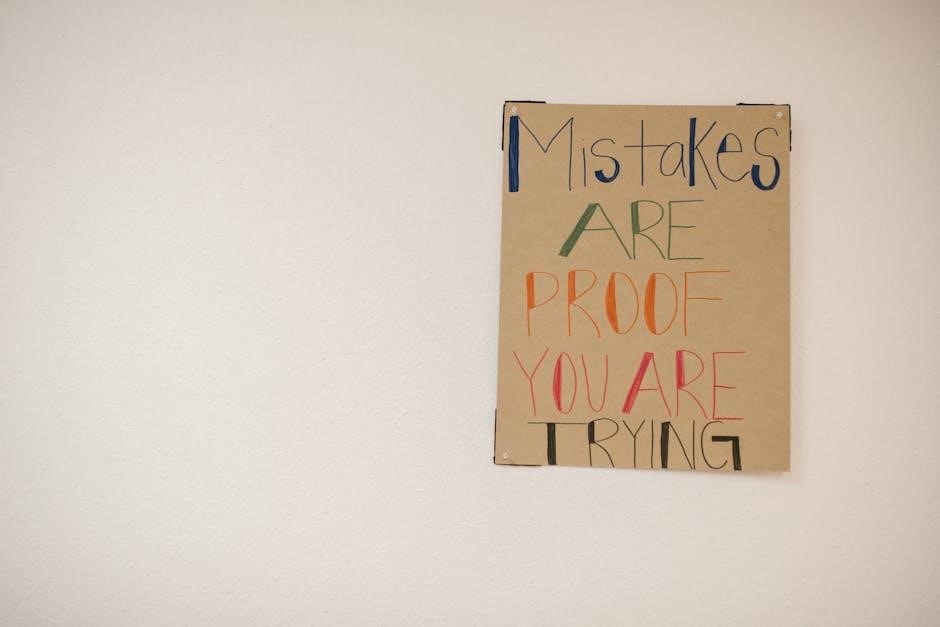The book Mistakes Were Made But Not by Me PDF explores human behavior and mistakes, offering insights into self-justification and cognitive biases, using real-life examples and psychological theories to explain human actions and decisions clearly online.
Overview of the Book
The book Mistakes Were Made But Not by Me provides a comprehensive overview of how people react to mistakes and failures, and how they often justify and rationalize their actions.
The authors use various psychological theories and real-life examples to illustrate the concept of self-justification and its consequences.
The book is written in an engaging and accessible style, making it easy for readers to understand complex psychological concepts.
The authors also offer practical advice on how to overcome self-justification and learn from mistakes, which is essential for personal growth and development.
The book has received positive reviews from readers and critics alike, with many praising its insightful and thought-provoking analysis of human behavior.
The book’s message is clear: by acknowledging and learning from our mistakes, we can become better versions of ourselves.
The book is a valuable resource for anyone looking to improve their relationships, achieve personal growth, and develop a greater understanding of themselves and others.
The book’s themes and ideas are widely applicable, making it a great read for people from all walks of life.

Authors and Publication Details
Written by Carol Tavris and Elliot Aronson, published in 2007 by Harcourt, the book is a non-fiction work exploring cognitive biases online clearly and concisely every day.
Carol Tavris and Elliot Aronson as Authors
Carol Tavris and Elliot Aronson are the authors of the book Mistakes Were Made But Not by Me, which was published in 2007.
They are social psychologists who have written extensively on cognitive biases and self-justification.
Their work has been widely acclaimed and has contributed significantly to our understanding of human behavior and decision-making.
As authors, they bring a wealth of knowledge and expertise to the topic, making the book a valuable resource for anyone interested in psychology and human behavior.
Their writing style is clear and concise, making the book accessible to a wide range of readers.
The authors’ use of real-life examples and case studies helps to illustrate the concepts and theories discussed in the book, making it easier for readers to understand and apply the principles to their own lives.
Overall, Carol Tavris and Elliot Aronson are well-respected authors in their field, and their book Mistakes Were Made But Not by Me is a testament to their expertise and knowledge.
The book has been updated and revised, with new editions being published to reflect the latest research and findings in the field.

Key Concepts and Theories
Exploring cognitive dissonance and biases through psychological theories and online research clearly explained.
Cognitive Dissonance and Confirmation Bias
The concepts of cognitive dissonance and confirmation bias are central to understanding human behavior and decision-making, as discussed in the book Mistakes Were Made But Not by Me PDF. Cognitive dissonance refers to the feeling of discomfort or tension that arises when an individual holds two or more conflicting beliefs, values, or attitudes. This discomfort motivates people to reduce the dissonance by changing one of their beliefs or justifying their behavior. Confirmation bias, on the other hand, is the tendency to seek out and give more weight to information that confirms one’s existing beliefs, while ignoring or downplaying contradictory evidence. These psychological phenomena are closely related and can lead to self-justification and rationalization of mistakes. By understanding these biases, individuals can become more aware of their own thought patterns and behaviors, and take steps to overcome them. This awareness is essential for personal growth and development, and for making better decisions in the future.

Explanation of Self-Justification
Self-justification is a psychological process where individuals rationalize their mistakes, using cognitive biases to maintain a positive self-image and avoid feelings of guilt or shame, as explained in the book clearly online.
How Self-Justification Works and its Consequences
Self-justification is a complex psychological process that involves rationalizing one’s mistakes to maintain a positive self-image. According to the book, this process works by creating a positive feedback loop of action and self-justification, where individuals convince themselves that their actions were justified, even if they were wrong. This can lead to a range of negative consequences, including the repetition of mistakes, damaged relationships, and a lack of personal growth. The authors argue that self-justification is a common phenomenon that can affect anyone, regardless of their intelligence, education, or social status. By understanding how self-justification works, individuals can take steps to overcome it and develop a more realistic and honest view of themselves and their actions. This can involve recognizing and challenging one’s own biases and assumptions, and being more open to feedback and criticism from others. Ultimately, overcoming self-justification requires a willingness to confront and learn from one’s mistakes, rather than trying to justify or deny them.

Learning from Mistakes
Learning from mistakes is essential for personal growth, using experiences to improve decision-making and behavior over time naturally online.
Importance of Owning Up and Letting Go of the Need to be Right
Owning up to mistakes is crucial for personal growth and development, allowing individuals to learn from their errors and move forward. The need to be right can be a significant obstacle to this process, as it can lead to denial and justification of harmful actions. By letting go of this need, individuals can begin to take responsibility for their mistakes and work towards making amends. This can involve acknowledging the harm caused, making apologies, and taking steps to prevent similar mistakes from happening in the future. The importance of owning up and letting go of the need to be right is emphasized in the book, which provides guidance on how to overcome self-justification and develop a more constructive approach to mistakes. By doing so, individuals can develop greater self-awareness, improve their relationships, and become more accountable for their actions. This can lead to greater personal and professional success, as well as a more positive impact on those around them.
